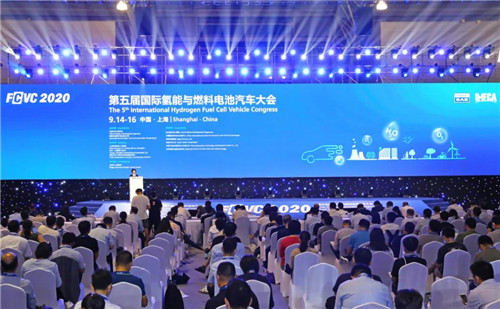 |
|
The 2020 International Hydrogen Fuel Cell Vehicle Congress opens in Shanghai's Jiading district Sept 14. [Photo/jiading.gov.cn] |
The 2020 International Hydrogen Fuel Cell Vehicle Congress (FCVC) opened in Shanghai's Jiading district Sept 14.
"China's hydrogen energy and fuel cell vehicle (FCV) industries have developed rapidly and made profits from mass production in the field of commercial vehicles," said Li Jun, president of China Society of Automotive Engineers (SAE-China), at the meeting
"Many performance indicators for fuel cells have been greatly improved, and the mileage and costs also show greater advantages."
Li, also an academician at the Chinese Academy of Engineering, said that Jiading, driven by China's efforts to promote the demonstration and application of fuel cell vehicles, will combine the driving forces of scientific and technological innovation and market demonstration, and strengthen international cooperation, in an effort to promote the rapid development of China's hydrogen energy and fuel cell vehicle industry.
Shanghai will release an innovative plan for development of fuel cell vehicles, according to Zhang Jianming, deputy director of Shanghai Commission of Economy and Information.
He said the city will build nearly 100 large hydrogenation stations by 2023, and the output value of the industry will increase to about 100 billion yuan ($14.66 billion).
Lu Fangzhou, Party chief of Jiading, detailed the district's efforts in developing the industry and building a favorable ecology that will cover the whole industrial chain. He said the industry has sped up the rate of achieving technological breakthroughs, building industrial clusters and improving technical services.
Jiading will further upgrade its FCV sector and strive to develop into a globally competitive hydrogen energy hub. It also plans to seek innovation-driven development in technological research, demonstrative application and industrialization, as well as improve its business environment and offer tailored services for investors, he added.
At the opening ceremony, several platforms that will help to better drive the industry were launched, such as a hydrogen energy and FCV technology service platform.
As the first Chinese city to make the hydrogen energy and fuel cell industry a regional strategy, Shanghai launched China's first guideline for the planning of fuel-cell industry in 2017, and an industrial park was set up in Jiading in June 2019. It also became one of 26 featured industrial parks in the city.
At the conference, a guideline for the hydrogen energy hub was unveiled. Anting town and Shanghai International Automobile City (Group) Co signed deals with 10 enterprises in the hub.
Since its first session in 2016, the annual event has been held by SAE-China and the International Hydrogen Fuel Cell Association (IHFCA) for five consecutive years. It is an international summit to connect government policymakers, fuel cell technology developers, FCV automakers, and investors.
The FCVC 2020 included a plenary meeting, four forums, a test drive and a technology exhibition, attracting more than 600 participants. A total of 127 companies brought their latest technologies and products to the event. Representatives from governments, enterprises and research institutes focused on demonstration projects, key technologies, infrastructure construction, formulation of policies, standards and regulations, and investment.
Peng Suping, a professor at China University of Mining and Technology (Beijing), Gao Xiang, head of the district, and Lu Zufang, head of the United Front Work Department of Jiading also attended the event.

